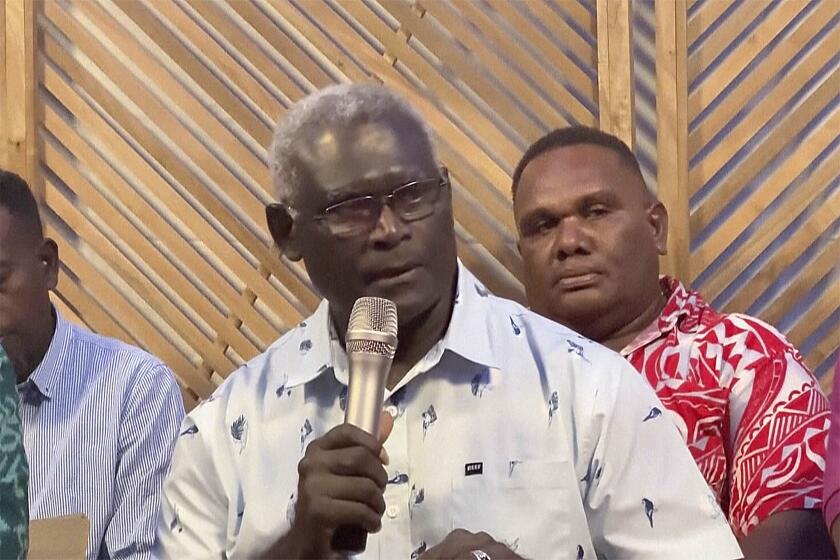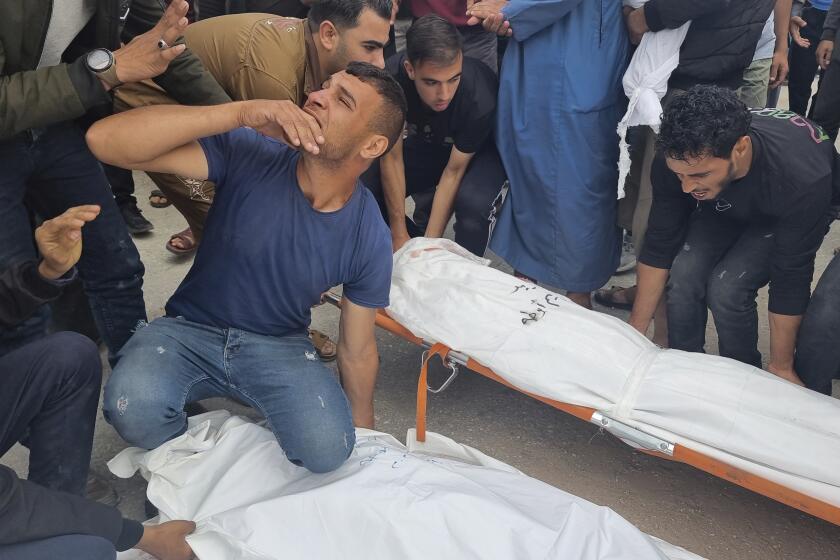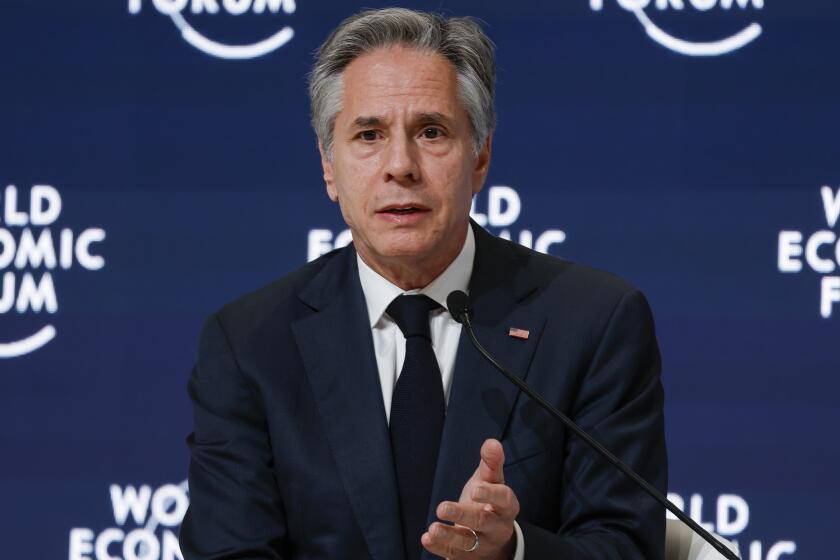With Uribe era ending, Colombia looks back and ahead
On his inauguration day eight years ago, leftist guerrillas tried to kill Colombian President Alvaro Uribe with a rocket and mortar attack. The U.S. government had drawn up contingency plans for a rebel-led government, and citizens were hunkering down in their homes at night in fear.
As Colombians who lived through those dark days know, Uribe on Saturday will turn over a far safer country to his successor, former Defense Minister Juan Manuel Santos, who was elected in a June landslide after promising to continue Uribe’s policies.
With billions in U.S. aid under Plan Colombia, the hard-line Uribe knocked the FARC guerrilla group on its heels, giving the government the upper hand in its 4-decade-long struggle against insurgents. Expanded police ranks have sharply reduced violent crime in cities. A tripling in foreign investment since 2003, mainly in mining, energy and tourism, is fueling an increasingly dynamic economy.
“We were overwhelmed with our problems when he took office,” said Mauricio Cardenas, a Colombian economist at the Brookings Institution in Washington. “Now we’ve regained self-esteem and, fundamentally, Colombia has become more of a nation.”
But Uribe leaves a troubling legacy of human rights violations and possible abuses of power. Under pressure to increase body counts, the military may have killed hundreds of civilians and tagged them as guerrilla casualties. Intelligence officials claim that Uribe’s office authorized scores of illegal wiretaps on judges, political opponents and journalists. And despite the massive infusion of U.S. aid, Colombia remains the world’s largest producer of cocaine.
“What Uribe achieved is really remarkable. But the issues are the collateral damages in human rights and how to remedy them,” said Jorge Castaneda, a former Mexican foreign minister and presidential candidate and now a professor at New York University.
Uribe, the son of a wealthy rancher killed by rebels in 1983, made a strong connection with Colombians impressed with his work ethic, his plainspoken style and messianic self-confidence. Santos, scion of an elite family that owns part of Colombia’s most powerful daily newspaper, is more of a consensus-building technocrat.
While promising to continue Uribe’s get-tough security policies, Santos acknowledges that his most pressing challenges are socioeconomic. Colombia’s poverty rate — 46% — is among Latin America’s highest. Unequal income distribution worsened under Uribe, and the informal economy of people working under the government radar grew, said Francisco Thoumi, a Colombian economist and former Latin American studies professor at the University of Texas.
Finance Minister-designate Juan Carlos Echeverry said last week that sweeping economic reforms addressing jobs and informal employment would be among the first initiatives that Santos undertakes. With a legislative coalition of 80% of Congress backing him, Santos has good odds for success.
But Santos also must forcefully move to reduce human rights abuses and institutional illegality that cropped up during Uribe’s eight years of government. Uribe’s constant attacks on judges who questioned or checked his power worked to weaken the judiciary and the nation’s balance of power, said University of Miami professor Bruce Bagley.
In addition, Santos inherits tense relations with neighboring Venezuela that could spark a conflict. Offering videos and photos as proof, Uribe last month accused Venezuelan President Hugo Chavez of tolerating the presence of 1,500 leftist rebel fighters and several top leaders in his territory and challenged him to allow international monitors to prove, or disprove, their presence.
Although Colombian officials have made the accusations before, it was the first time, according to Castaneda, that Uribe had created a “Stevenson moment,” a reference to the use in 1962 by Adlai Stevenson, then the U.S. ambassador to the United Nations, of U.S. reconnaissance photos to prove the presence of Russian missiles in Cuba.
Chavez responded with denials, cutting all diplomatic ties and clamping down tighter on trade with Colombia. A special meeting of regional foreign ministers last week did little to ease tensions. If the situation continues, Colombia not only will continue to lose billions of dollars in exports to Venezuela, but Santos will make “far more limited and slower security gains” during his administration, Bagley said.
“It’s a big deal. Colombia’s military strategy is based on driving the FARC into the hinterlands and to borders, where their neighbors are supposed to deny them entry and act as an anvil against which the Colombian military’s hammer can hit,” Bagley said. “Without the cooperation of Venezuela, the FARC, which was severely weakened by Uribe, can hang on for a very long time.”
Santos is also expected to try to improve Colombia’s relations with the rest of Latin America, the nation having found itself isolated by Chavez and other left-leaning governments in Ecuador, Bolivia and Argentina. But Castaneda noted that with new center-right presidents elected in Chile and Panama, the job is easier.
“Also, it’s easier for Latin countries to be [President] Obama’s friend than it was to be President Bush’s friend,” Castaneda said.
Uribe, however, took advantage of the fact that he was Bush’s friend: Framing his fight against the FARC as an anti-terrorism struggle reaped a bonanza in U.S. aid to modernize and expand his military. Santos, on the other hand, faces the prospect of significant reductions in U.S. aid because of shifting priorities in Washington.
Despite the challenges, Santos has the opportunity to move Colombia to “second base,” in economist Thoumi’s words, by modernizing a country rich in potential whose development has been retarded by decades of civil war and violence.
Farm laborer Eva Gordillo of Bogota, the capital, speaks for many Colombians when she says that she wishes the Uribe era would never end and that she would have voted for him a third time had the Supreme Court not quashed a reelection bid in February.
“I cried when he decided not to run,” Gordillo said. “It’s to him we owe the improved security in the country.”
Kraul is a special correspondent. Special correspondent Jenny Carolina Gonzalez contributed to this report.
More to Read
Start your day right
Sign up for Essential California for news, features and recommendations from the L.A. Times and beyond in your inbox six days a week.
You may occasionally receive promotional content from the Los Angeles Times.






